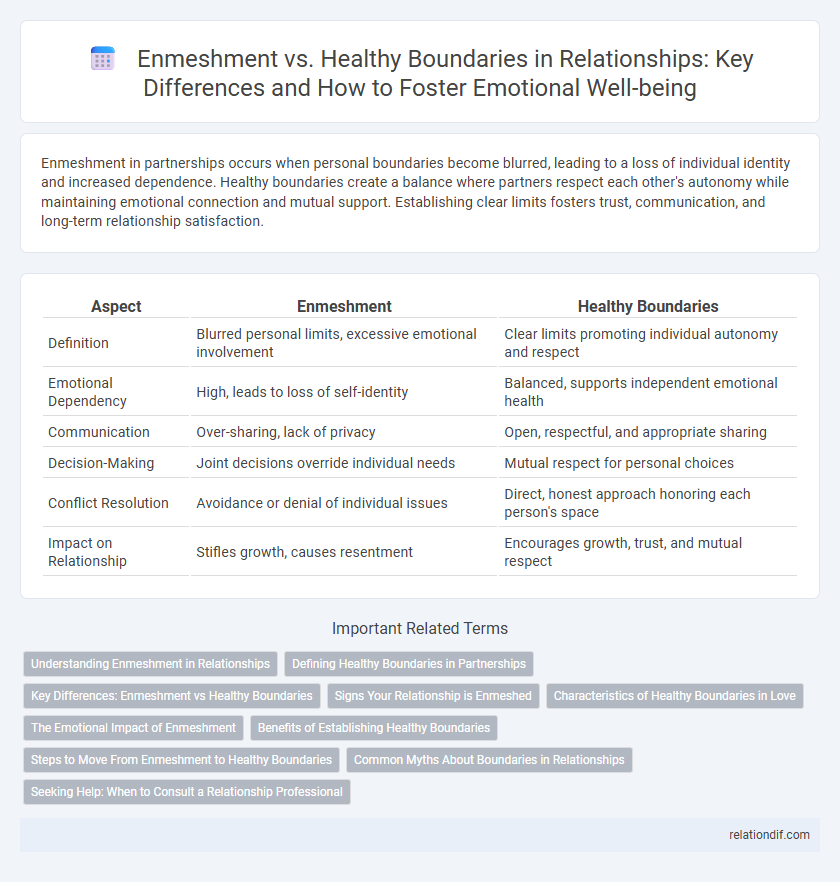Enmeshment in partnerships occurs when personal boundaries become blurred, leading to a loss of individual identity and increased dependence. Healthy boundaries create a balance where partners respect each other's autonomy while maintaining emotional connection and mutual support. Establishing clear limits fosters trust, communication, and long-term relationship satisfaction.
Table of Comparison
| Aspect | Enmeshment | Healthy Boundaries |
|---|---|---|
| Definition | Blurred personal limits, excessive emotional involvement | Clear limits promoting individual autonomy and respect |
| Emotional Dependency | High, leads to loss of self-identity | Balanced, supports independent emotional health |
| Communication | Over-sharing, lack of privacy | Open, respectful, and appropriate sharing |
| Decision-Making | Joint decisions override individual needs | Mutual respect for personal choices |
| Conflict Resolution | Avoidance or denial of individual issues | Direct, honest approach honoring each person's space |
| Impact on Relationship | Stifles growth, causes resentment | Encourages growth, trust, and mutual respect |
Understanding Enmeshment in Relationships
Enmeshment in relationships occurs when personal boundaries become excessively blurred, leading to a lack of individual autonomy and emotional independence between partners. This dynamic often results in over-involvement in each other's lives, where personal identities fuse, causing difficulties in decision-making and self-expression. Recognizing enmeshment is crucial for cultivating healthy boundaries that promote growth, respect, and emotional well-being within partnerships.
Defining Healthy Boundaries in Partnerships
Healthy boundaries in partnerships establish clear limits that protect each partner's individuality and foster mutual respect. These boundaries enable open communication, ensure emotional safety, and prevent enmeshment by maintaining a balance between closeness and personal autonomy. Defining healthy boundaries involves recognizing and honoring each partner's needs, values, and personal space within the relationship.
Key Differences: Enmeshment vs Healthy Boundaries
Enmeshment involves blurred or nonexistent boundaries leading to over-dependence and loss of individual identity, while healthy boundaries maintain clear limits that support personal autonomy and mutual respect. In enmeshed relationships, emotional entanglement creates difficulty in distinguishing personal feelings from others, whereas healthy boundaries promote emotional independence and accountability. Key differences include the degree of separation, communication clarity, and the ability to prioritize self-care without guilt or conflict.
Signs Your Relationship is Enmeshed
Signs your relationship is enmeshed include a lack of personal boundaries where individual identities merge, leading to an unhealthy dependency on each other's emotions and decisions. Constant need for approval and an inability to make independent choices highlight blurred boundaries that undermine autonomy. Emotional fusion triggers conflict avoidance and difficulty distinguishing personal needs, signaling a need to establish healthy limits for a balanced and respectful partnership.
Characteristics of Healthy Boundaries in Love
Healthy boundaries in love involve clear communication, mutual respect, and the ability to maintain individuality within the relationship. Partners recognize and honor each other's personal space, emotions, and limits while fostering trust and emotional safety. Establishing healthy boundaries promotes emotional intimacy without enmeshment, allowing partners to support growth and independence.
The Emotional Impact of Enmeshment
Enmeshment in partnerships leads to blurred personal boundaries, causing partners to lose their individual identities and experience heightened emotional dependency. This emotional entanglement often results in anxiety, resentment, and a lack of autonomy, impairing personal growth and relationship satisfaction. Establishing healthy boundaries promotes emotional resilience and mutual respect, fostering a balanced and fulfilling partnership.
Benefits of Establishing Healthy Boundaries
Establishing healthy boundaries in partnerships fosters mutual respect and clear communication, reducing conflicts and misunderstandings. It enhances individual autonomy while maintaining emotional connection, promoting trust and long-term stability. Clear boundaries also support personal growth and well-being, creating a balanced and fulfilling relationship dynamic.
Steps to Move From Enmeshment to Healthy Boundaries
Identifying enmeshment patterns involves recognizing blurred personal boundaries and excessive emotional dependency within the partnership. Establishing clear communication channels and expressing individual needs assertively fosters the development of healthy boundaries. Gradually integrating autonomy while maintaining emotional connection strengthens the partnership's resilience and mutual respect.
Common Myths About Boundaries in Relationships
Common myths about boundaries in relationships include the belief that setting boundaries means being selfish or creating distance between partners. Many assume healthy boundaries restrict intimacy, but they actually foster respect, trust, and emotional safety for both individuals. Understanding that boundaries promote connection rather than separation is crucial for a balanced and thriving partnership.
Seeking Help: When to Consult a Relationship Professional
Recognizing when enmeshment blurs personal boundaries is crucial for maintaining a healthy partnership. Consulting a relationship professional becomes essential if individual identities are compromised or communication patterns foster dependency instead of support. Early intervention helps couples develop effective boundaries that promote mutual respect and emotional well-being.
Enmeshment vs Healthy Boundaries Infographic

 relationdif.com
relationdif.com